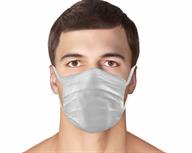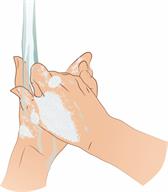Airborne Precautions
Airborne precautions are guidelines for the care of a person who has a disease that spreads through germs (particles) in the air. Examples of airborne diseases include measles, chickenpox, smallpox, tuberculosis, and possibly severe acute respiratory syndrome (SARS)-associated coronavirus. Following these guidelines helps keep the disease from spreading to others.
Guidelines for patients
If you have an airborne disease, follow these guidelines at the hospital or clinic:
- You will be treated in a private room with a special air supply.
Keep the door to your private room closed.
Wear a mask in your room as told by your nurse.
Check with your nurse before you leave your room.
Wear a mask if you must go to another area of the hospital or clinic. Leave your room only when medically necessary. Make sure that the mask fits tightly.
Cover your mouth with a tissue when you cough.
Cover your mouth and nose with a tissue when you sneeze.
If you have sores that can spread the infection (infectious lesions), keep the affected areas covered.
Wash your hands often with soap and water for at least 20 seconds. This is an important way to prevent spread of the disease. If soap and water are not available, use an alcohol-based hand sanitizer.
Guidelines for visitors
If you are visiting someone who has an airborne disease, follow these guidelines:
Check with a nurse before you enter a room that has a sign that says "Airborne Precautions."
If you are allowed to enter the room, you will be asked to wash your hands and wear a mask over your nose and mouth. Make sure that the mask fits tightly.
Do not take off your mask in the room.
Do not eat or drink in the room.
Do not use or touch any items in the room unless you ask a nurse first.
- Right after you leave the room:
Take off your mask. Throw it in the trash.
Wash your hands with soap and water for at least 20 seconds. This is an important way to prevent spread of the disease. If soap and water are not available, use an alcohol-based hand sanitizer.
Summary
-
Airborne precautions are guidelines for the care of a person who has a disease that spreads through germs (particles) in the air.
-
If you are a patient, keep the door to your room closed and wear a mask.
-
If you are a visitor, check with the nurse before you enter the room, and wear a mask. Do not take it off while in the room.
-
For both patients and visitors, washing your hands with soap and water for at least 20 seconds is an important way to prevent spread of disease. If soap and water are not available, use an alcohol-based hand sanitizer.
This information is not intended to replace advice given to you by your health care provider. Make sure you discuss any questions you have with your health care provider.

